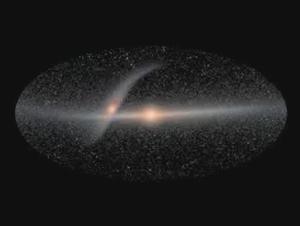
The most recent scientific estimates are that our sun's lifespan is about 10 billion years, and we are not quite halfway through it, our life source being around four and a half billion years old. The earth is somewhat younger, but under normal conditions would last about the same as the sun, until the sun goes nova, engulfing us in a quick nuclear flameout.
Unfortunately for us, the universe is not so normal. It is estimated that the nearest large galaxy, Andromeda, is on a collision course with our own Milky Way, and is due to hit us in three billion years or so. And while our sun may survive, things don't look as rosy for our homeworld.
Based on our 'safe' location in one of the galactic arms (safe from the ravages of our galactic core), computer simulations show us being ejected from the Milky Way by the Andromeda collision, and sent into a crazy elliptical, almost comet-like orbit around the merging galaxies. Our Solar system will fly out (all well and good) but then careen back into the merging mess, slamming us through the galactic core, and then spun out again. The cycle will repeat itself over and over until our sun does it's normal burnout or is torn to shreds by the (likely) massive black hole at the center of the galaxy. Earth wont be so lucky. If it survives the initial collision and ejection, it almost certainly will be obliterated by the first pass through the center of the galaxies.
The astronomer John Dubinski, of the University of Toronto, has produced a series of helpful movies of our future doom. 'Galaxies in Collision' shows the event from the peace of distant space, making the violence like a ballet. My personal favorite, 'Future Sky', shows the collision from Earth's vantagepoint. It's fun to watch us repeatedly slam into the center of the madness.
Don't forget to vote.